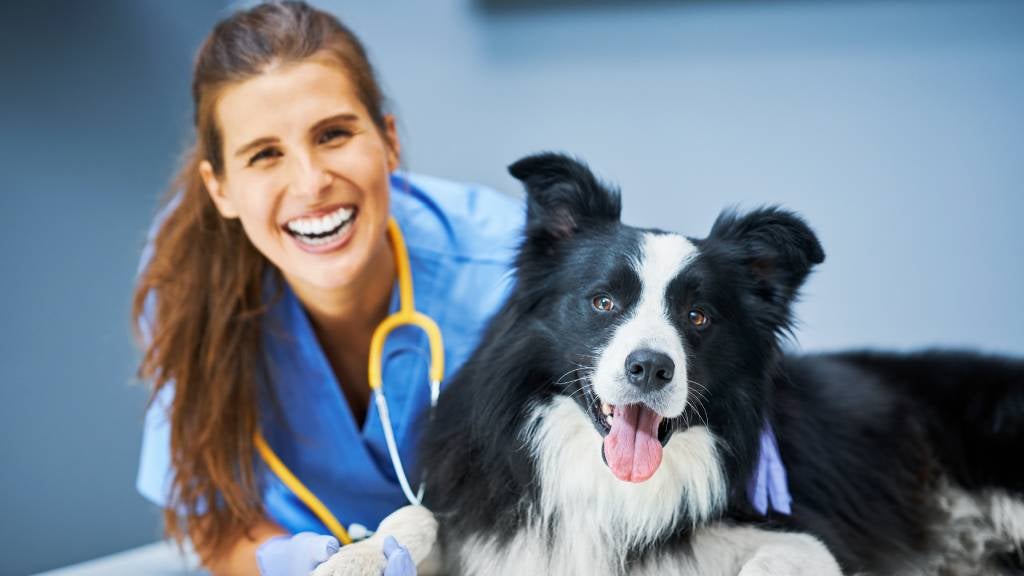What is a vet behaviourist?

Ever find yourself scratching your head at some of your pet's behaviours? Why are they eating grass all of a sudden? Why are they barking at the postie every day?
Every behaviour has a reason, and as pet owners, it's our responsibility to understand and address these behaviours as effectively as possible. But it's not always so simple.
In the world of veterinary medicine, there's an unsung hero who's all about getting into an animal's head – the vet behaviourist.
But what sets these professionals apart from the traditional veterinarian or a pet trainer? Dr Emma Ruck BVSc (Dist) MANZCVS, a prominent figure in the veterinary community, elaborates on the remarkable role of vet behaviourists and why they deserve prominence in every pet owner's mind.
What is a vet behaviourist?
A veterinary behaviourist is a specialised veterinarian who dedicates their practice to understanding, diagnosing, and treating behavioural issues in pets, primarily dogs and cats.
In New Zealand, Dr Ruck highlights how the title is applied to veterinarians who have passed the Membership of Australia and New Zealand College of Veterinary Scientists (MANZCVS) examinations. This means, “they have undertaken extensive extra study and have a high level of knowledge about animal behaviour and welfare in a variety of species.”
Only a vet behaviourist with extensive training in animal behaviour and who has passed an examination process set out by ANZCVS Veterinary, and is qualified to diagnose serious behavioural issues potentially rooted in medical conditions, distinguishing them significantly from other pet professionals. As many work in both general practice and referral behaviour practice, they can address behaviour cases with a wide knowledge of both physical and mental conditions.
Their unique qualifications allow them to approach animal behaviour holistically, blending medical knowledge with behavioural science to improve the lives of pets and their owners.
What does a vet behaviourist cover?
Vet behaviourists take into consideration the history of the animal’s physical health, and concerns of the pet parent, before making a diagnosis.
They also work closely with other veterinarians and pet professionals to ensure comprehensive patient care. From this evaluation, a treatment plan is created.
Dr Ruck details what this plan typically involves:
- Management: To assist pet parents and minimise factors contributing to the behaviour of their concerns
- Behaviour modification: A set of training-like exercises to help manage the pet’s emotions and help to increase the bond between the pet parent and their pet. In many behaviour clinics, there are qualified, force-free trainers who work alongside vet behaviourists, to create this plan and provide further support
- Medication: A behaviour disorder may involve essential medication that is supplied regularly or in situational circumstances. The vet behaviourist will discuss all aspects of medication and what to expect.
- Monitoring: Regular monitoring of both how the pet is progressing and how the pet parent is feeling is essential. Video footage, diaries, journals or other forms of monitoring are encouraged to help inform the vet behaviourists’ recommendations.
- Referral for further testing: In some cases, the vet behaviourist will work with other veterinary professionals to investigate further physical health aspects of the patient so that these can be managed alongside the behaviour component, providing a holistic treatment plan. This is particularly relevant for cases where pain is suspected.
In short, vet behaviourists are highly skilled professionals who go above and beyond to provide comprehensive pet care to improve their behavioural health.
How are vet behaviourists beneficial for dogs?
Vet behaviourists play a crucial role in enhancing the well-being of dogs by addressing and treating behavioural issues that can significantly impact their quality of life and their relationships with their owners or other animals in the home.
Vet behaviourists can be game changers for dogs struggling with behavioural issues, or experiencing a sudden change in behaviour. Here's a look at some common ones they help with, ranging from frustrating but normal behaviours, to more serious behaviour disorders as covered by Dr Ruck:
- Puppy biting
- Lead reactivity and pulling
- Jumping
- House soiling
- Excessive barking
- Destructive behaviour
- Separation distress
- Phobias and fears
- Aggression
- Resource guarding
- Compulsive behaviours
- Cognitive dysfunction syndrome
- Generalised anxiety disorder
By tailoring behavioural modification strategies and integrating medication, vet behaviourists can significantly improve a dog's quality of life.
Dr Ruck emphasises how an extensive knowledge of normal and abnormal dog behaviour and body language can help the pet parent to better understand their dog and why they behave the way they do. This empowers owners with the understanding and tools needed to support their pets effectively, enhancing the bond between dogs and their humans.
How are vet behaviourists beneficial for cats?
Vet behaviourists can also offer significant benefits for cats. These professionals are exceptionally skilled in diagnosing and treating a range of behavioural problems, such as:
- Inappropriate urination or spraying
- Aggression
- Excessive grooming
- Anxiety
- Destructive scratching
- Litter box issues
- Fighting between cats in the same household
The expertise of vet behaviourists is particularly crucial because many behavioural issues in cats can be symptomatic of underlying medical problems. With their veterinary background, behaviourists are equipped to perform comprehensive evaluations, ruling out or treating medical conditions that could be contributing to the observed behaviours. As Dr Ruck specifies, they can also, “evaluate whether pain medication, behaviour medication, pheromone therapy or diet therapy may be beneficial – often it is a combination of all of the above!”
A lack of understanding of a cat’s needs, whether emotionally or environmentally, is another leading cause for behaviour issues. According to Dr Ruck, vet behaviourists can provide guidance on environmental enrichment, which can significantly improve the overall well-being of indoor cats. This can include, “increasing the number and size of litter tray/s, introducing more vertically and horizontally available spaces for the cat to interact with, and providing more enrichment through play.”
In essence, vet behaviourists play an indispensable role in enhancing cats' mental health and overall well-being, ensuring they lead happier, healthier lives as valued members of their human families.
What is covered by SPCA Pet Insurance?
By partnering with vet behaviourists, SPCA Pet Insurance aims to promote pets' overall health and well-being across Aotearoa. SPCA Pet Insurance is there to help with those surprise vet bills you can't really plan for and helps to cover treatments if your pet is unexpectedly sick or accidentally injured, relieving pet owners of the financial burden and allowing them to focus on their pet's recovery.
28 Jun 2024
